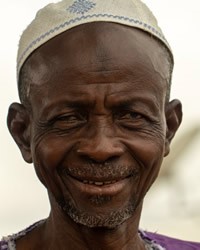Hausa in Sudan

Photo Source:
Erik Laursen, New Covenant Missions
|
Send Joshua Project a map of this people group.
|
| People Name: | Hausa |
| Country: | Sudan |
| 10/40 Window: | Yes |
| Population: | 137,000 |
| World Population: | 59,120,000 |
| Primary Language: | Hausa |
| Primary Religion: | Islam |
| Christian Adherents: | 0.01 % |
| Evangelicals: | 0.00 % |
| Scripture: | Complete Bible |
| Ministry Resources: | Yes |
| Jesus Film: | Yes |
| Audio Recordings: | Yes |
| People Cluster: | Hausa |
| Affinity Bloc: | Sub-Saharan Peoples |
| Progress Level: |
|
Introduction / History
The Hausa are the largest ethnic group in all of West Africa. Parts of Nigeria are known as "Hausaland." The Hausa are very influential in West Africa, both culturally and politically.
The Hausa have been heavily involved in long distance trading for many centuries. Traders once exchanged gold from the Middle East for leather, crafts, and food. In the process of traveling and trading, some Hausa people have migrated east to places like Sudan, which is over 2,000 miles from Hausaland. Sudan is as far east as the Hausas have settled. In Sudan, the Hausas mingle with the local population, which is an Arabic-centered culture. They are no longer in a Hausa and Fulani-dominated culture like those who live in West Africa.
Some have wrongly assumed that Boko Haram comes from the Hausa because the term itself is from the Hausa language. But Boko Haram is mainly from Kanuri and Fulani as well as other tribes.
What Are Their Lives Like?
In comparison to some other African tribes, the Hausa have reasonable standards of health care, diet, shelter, electricity, and education. However, life for the Hausa is still very difficult. For example, they suffer from a high unemployment rate, and only about half of the population can read and write. Within the Hausa's social structure, individuals are classified as either being "commoners" or "chiefs," depending on which profession they hold and the amount of wealth they possess.
In marriage relationships, close relatives, preferably cousins, are chosen as partners. Marriages are arranged, and ceremonies last for weeks. Everyone is to appear happy except the bride. In the village compounds, each wife has her own hut where she and her young children sleep. Often the husband has his own hut where the wives take turns spending the night. Due to the high divorce rate, there is a large population of single women, especially in the cities. The Hausa are ashamed of their firstborn, who are often given to relatives to raise.
What Are Their Beliefs?
By 1500, Islam had been introduced to the Hausa by traders. Many of the urban Hausa embraced it right away, in hopes of enhancing their businesses. However, the villagers were not as receptive to this new religion.
In the "holy wars" of 1804 and 1808, the Hausa were conquered by the Fulani, their strongly Islamic neighbors. They were made slaves until the early 1900s. At that time, many of the villagers were either forced or bribed into becoming Muslim. They adopted some of Islam's basic outward behaviors and rituals, but did not "sell out" as many of the urban Hausa did. For that reason, many of the rural Hausa today are only superficially Muslim. Eventually the Hausas and Fulani merged in West Africa, and the Hausa also became propagators of Islam.
Because Islam was carried throughout Africa by Hausa traders and priests, nearly everyone expects a Hausa to be Muslim. This could be one of the main reasons why the Hausa stay so resistant to the gospel. The Hausa culture is strongly linked to Islam, which makes it difficult to reach this people group with the gospel. Among the Muslim populations of Sudan there is a lot of prejudice against Christians, so the Hausas are not likely to be receptive to them.
What Are Their Needs?
The Hausa have physical needs such as education and safe drinking water. Many are in need of jobs.
Prayer Points
Pray that the Hausa would come to know Jesus, the giver of living water.
Thank God for the Hausa Bible and the powerful impact that the Holy Scriptures has upon Muslims.
Pray for Bible studies and church planting movements to start among the Hausa people throughout Africa.